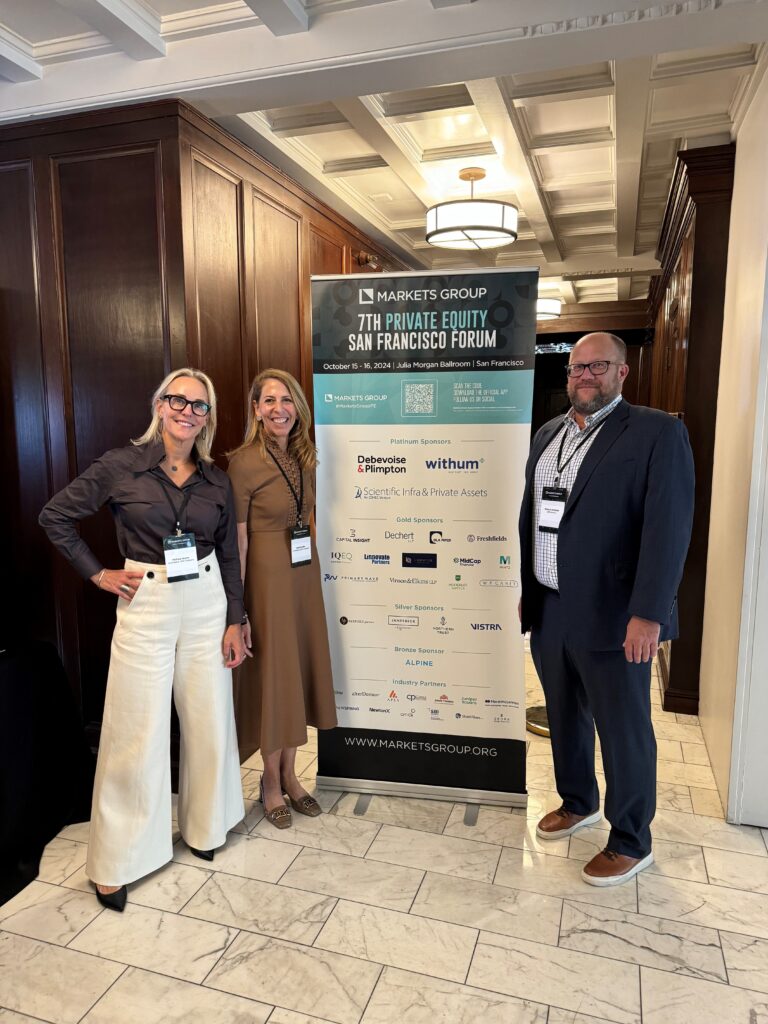Insights from the Markets Group Private Equity Conference in San Francisco
Fundraising remains a critical challenge for private equity firms in 2024, with most GPs struggling to secure capital in an increasingly competitive landscape. Melissa Norris and Beth Rustin hosted a roundtable at the Markets Group Private Equity Forum in San Francisco, where they facilitated a discussion with over twenty general partners and service providers from across the US. The discussion highlighted many of the fundraising difficulties faced by private equity firms and how they are addressing these challenges.
The Current Fundraising Landscape
As of June 30, 2024, private equity fundraising has declined by a staggering 40% year-over-year. A notable trend is the growing share of capital flowing to mega funds, leaving mid-sized and smaller firms at a disadvantage. While certain sectors like credit and infrastructure are faring better, GPs focused on traditional buyouts are finding it particularly challenging to attract new capital.
Many firms that have opted to grow their distribution teams must reckon with the growth of market compensation for fundraisers, driven by the demand for private markets fundraising talent since the pandemic. While carry remains a tricky point of negotiation when hiring a senior fundraiser, many candidates are becoming more flexible as the value of their existing carry has decreased and exit timelines lengthened over the last few years.
The demand and competition for fundraising talent among PE firms is further exacerbated by the influx of traditional asset management firms hiring PE fundraisers to enhance their own private equity capabilities. Mega funds continue to grow their own teams across project management, product development and product specialists, with the focus remaining on capital raisers across all geographies and investor channels.
Key Strategies to Tackle Fundraising Challenges
- Focus on Fundraising Talent
As competition intensifies, attracting top fundraising talent has become paramount. GPs prioritize candidates with established networks and a proven track record of raising assets. There is increased demand for fundraisers who can build and sustain relationships between fundraises and engage investors across multiple strategies/products. - New Investor Channels
Given the decline in appetite for private equity in traditional institutional channels, diversifying investor outreach is crucial. Private wealth and insurance channels, previously overlooked, are now in the crosshairs as priority fundraising channels. With many firms making inroads into new channels, firms are increasingly hiring insurance-dedicated fundraisers and substantial private wealth distribution teams. Firms are also turning in earnest toward the Middle East and Asia by hiring senior fundraisers with strong family office, pension, and sovereign wealth relationships in these regions. - Product Specialists
Firms with multiple strategies have sought to bring on dedicated product specialists to support a generalist sales force. With four strategies appearing to be the threshold for requiring dedicated experts, firms are recognizing the need for product specialists to drive fundraising efforts effectively. - Consultant Relations Talent
Private equity firms are increasingly engaging investment consulting firms and hiring Consultant Relations talent to navigate the dynamic between consultants and their institutional clients. Particularly for public plans, consultants and gatekeepers are critical to engage to even be considered for their PE allocation. - Reliance on Placement Agents
Firms are reaching into new geographies with specialized regional placement agents (Nordics, Latam), in addition to utilizing these groups for project management advisory and broader investor coverage and fundraising support in the US. Firms report mixed satisfaction and transactional engagements with such agents, but they are increasingly necessary for GPs to compete for capital in addition to leveraging an in-house team. - Co-Investments and Fee Breaks
Co-investment opportunities are table stakes to woo large institutional allocators. Firms are increasingly offering fee breaks and negotiating favorable terms to retain existing investors, making these offerings a critical component of their fundraising strategy. In many cases, co-investments are offered without fees as long as LPs invest in the flagship fund. - Strategic Project Management
GPs are increasingly harnessing data and metrics to enhance their fundraising strategy. This has created a need for more strategic heads of project management to handle the complexity. Investor Relations talent with advanced data analytics skills can analyze performance across territories to promote efficiency, better identify prospective investors, and more effectively create bespoke and customized materials for LPs.
Conclusion
As fundraising activity and trends in private equity continue to evolve, firms must adapt to the challenges posed by a competitive capital raising environment. For those interested in refining their fundraising strategies or exploring new avenues for capital, we invite you to reach out for further discussion.
Written by:
Melissa Norris, Founding Partner & Co-Head of Asset Management
Preston Richard, Managing Associate

Melissa Norris and Beth Rustin, Founding Partners and Co-Heads of Asset Management, Jamesbeck with Rich Hartman, Managing Partner and
Global Private Equity Practice Leader, ZRG.
